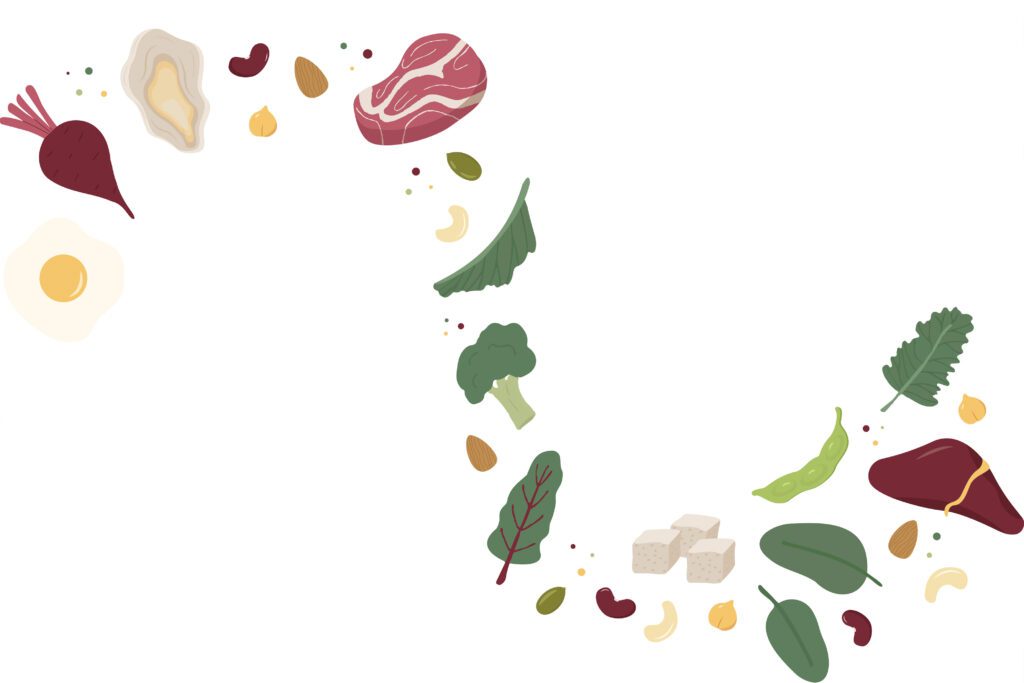What You Need to Know
Unless you’re living on ice cream and salad dressing, there’s a good chance you’re consuming iron – an essential nutrient – in your daily diet. Most of us know we need it, but what exactly does iron do, and how can you make sure you’re getting enough? Here, we’re addressing the most pressing questions related to this hot health topic.
Why is iron so important?
Iron is necessary for hemoglobin, a protein that carries oxygen from your lungs to the rest of your body, to function properly. In other words, without iron, you won’t make enough red blood cells and your tissues won’t receive the oxygen they need – affecting everything from neurological function to your immune system.
By keeping your iron levels in check, you’ll reap some pretty major benefits, such as:
- More energy – Iron can help eliminate fatigue and boost your energy levels. It’s also been proven to reduce irritability.


- Increased cognitive function – Research suggests that iron keeps you sharp – mentally, that is. Iron not only supports a healthy nervous system, but it also helps you concentrate.
- Enhanced athletic performance – Your muscles need oxygen to function at their best, which is why it’s so crucial to meet your iron needs.
- Stronger immune system – Low levels of iron in the blood can diminish your body’s immune response, whereas adequate iron stores will help the body fight off infection more efficiently.
Getting enough iron is especially important for women who are pregnant. This is because red blood cell production and overall blood volume greatly increase during pregnancy to support the growing fetus. As such, pregnant women should be consuming 27 milligrams of iron daily (only 18 milligrams a day is needed for women outside of pregnancy). Iron supplementation may be needed to ensure both mom and baby are healthy.
What happens when you have low iron?
Approximately 10 million people in the United States alone experience low iron levels, and about half of this number has been diagnosed with iron-deficiency anemia. Those most at risk for an iron deficiency include children, pregnant women or women who are menstruating, and anyone not getting enough iron in their diet (most often occurring among the elderly and vegetarians/vegans). While symptoms may appear mild at first – if at all – once the condition worsens, a person might experience:
- Fatigue or weakness
- Dizziness
- Shortness of breath
- Heart palpitations
- Sensitivity to cold
- Difficulty concentrating
- Headaches
- Changes in appearance: pale skin, hair loss, brittle nails
A simple blood test can determine if your iron levels are within the normal range. Iron deficiencies can typically be treated with iron supplementation as prescribed by your primary physician.
What foods are high in iron?
First, you should understand that iron comes in two types in your diet: heme iron and non-heme iron. Heme iron is only found in animal-derived foods, such as beef and certain seafood, while non-heme iron is in plants and foods that have been fortified with iron. Because the body naturally absorbs heme iron better than non-heme iron, those who follow a plant-based diet should be intentional about including high-iron foods at every meal; thankfully, pairing non-heme iron with vitamin C – found in many plants like broccoli, citrus, bell peppers, and leafy greens – will help boost iron absorption.
With that in mind, some of the best sources of iron include:
- Clams, oysters, and mussels
- Beef
- Poultry
- Fish such as tuna and sardines
- Beans and lentils
- Spinach
- Nuts
- Fortified cereals
- Tofu
- Dark chocolate
Additionally, studies have shown that cooking with cast-iron pots and pans increases the iron content of many foods, specifically acidic foods including tomato-based dishes, applesauce, and eggs.
As you can see, iron is a nutrient that shouldn’t be overlooked. To keep your body functioning at its best, make sure that you’re eating plenty of iron-rich foods, and if you’re concerned about your levels, get them checked out sooner rather than later!

